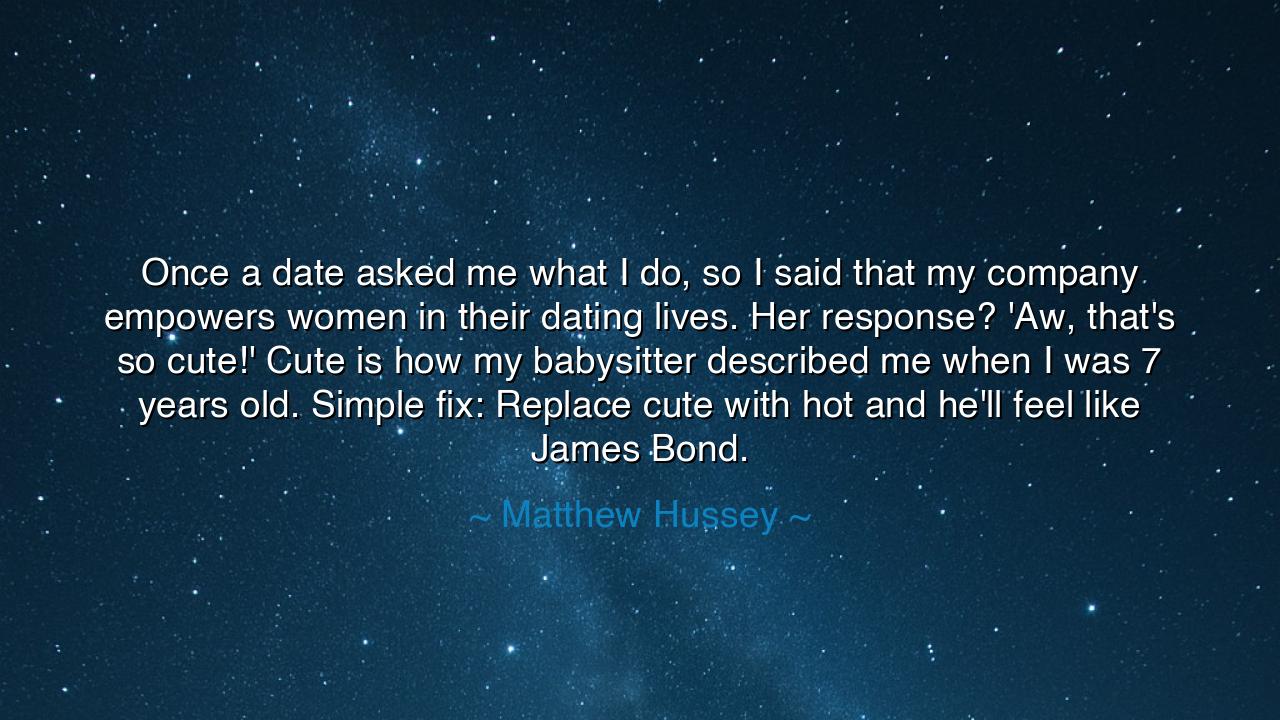
Once a date asked me what I do, so I said that my company
Once a date asked me what I do, so I said that my company empowers women in their dating lives. Her response? 'Aw, that's so cute!' Cute is how my babysitter described me when I was 7 years old. Simple fix: Replace cute with hot and he'll feel like James Bond.






In the bustling square of courtship, a voice of experience rises: Matthew Hussey tells a parable of words. “Once a date asked me what I do, so I said that my company empowers women in their dating lives. Her response? ‘Aw, that’s so cute!’ Cute is how my babysitter described me when I was 7 years old. Simple fix: Replace cute with hot and he’ll feel like James Bond.” Hear the deeper music beneath the jest: he is naming the alchemy of language—how a single syllable can crown or diminish, ignite pursuit or pour water on the flame. In love as in legend, we are moved not only by deeds but by the names we are given while doing them.
The ancients knew that a title can be a trumpet. Call a warrior “boy” and you hand him a wooden sword; call him “champion” and you set iron in his grip. So too in romance: cute is a cradle-word, round and harmless, fit for a nephew’s cheeks; hot is a flint-word, sparking charge and intent. When Hussey jokes that cute belonged to the seven-year-old, he is warning against the maternalizing glaze that smothers polarity. Lovers are not seeking guardians; they are seeking mirroring fire. A well-aimed compliment is not flattery—it is the recognition that calls the adult self to the front of the stage.
Consider a tale from the old schools of rhetoric. Cicero taught that praise must be apt—fitted to the hearer’s virtues and the moment’s aim. Praise the general for softness, and you confuse his compass; praise him for courage, discipline, and cunning timing, and you thicken his resolve. So it is on a first date. A man speaks of mission—“my company empowers women”—and the listener replies with a word that either frames him as a quaint helper-hobbyist (cute) or as a capable, desirable agent (hot). One syllable alters the scene: in the first, he is a mascot; in the second, a man.
A modern mirror makes it plainer. A founder I once counseled—call her Lila—kept hearing “adorable” after she pitched investors; the term felt like lace thrown over a locomotive. We rewrote her own descriptors, and we primed allies to reflect her reality with stronger language: “compelling,” “formidable,” “laser-focused.” Watch what happened: doors swung; posture changed; even her stride found new cadence. When, later, a suitor called her cute, she laughed and said, “I’ll take hot or brilliant.” He corrected course; the conversation warmed. Names do not make substance—but they do unlock it.
Let us be precise: Hussey’s counsel is not about pandering to ego; it is about speaking to the masculine current when you wish to invite it. In many men, desire wakes when they are seen as capable, attractive, directional—the sort of man who could step into a tux and feel a little like James Bond. This is not a decree about gender; it is a reminder about polarity: where you want spark, avoid lullabies. Use words that point to presence, strength, initiative, and yes, desire. “Hot” is shorthand. There are many doors to the same room: “magnetic,” “damn that’s attractive,” “you’re dangerous in the best way.”
From this, a clear lesson gleams: speak to the self you wish to dance with. If you want leadership, affirm initiative. If you want tenderness, praise attentiveness. If you want more dates that turn into chapters, choose language that opens the next page, not language that tucks the other person into bed with milk and a story. In love, words are steering wheels; small turns early save long detours later.
Practical rites for the road: (1) Retire cute for romantic contexts; reserve it for puppies and nieces. (2) Aim specific, high-signal praise: swap “nice” for “decisive,” “kind in the clutch,” “you handled that with style.” (3) Time your compliment to effort—after he plans, leads, or protects the frame: “That was hot.” (4) Match tone to intent—say it slowly, eye-to-eye; your delivery is half the meaning. (5) Mirror what you want more of: “When you took the lead on dinner, that was James Bond energy.” (6) Guard your own polarity: receive with warmth, not sarcasm; standards and sweetness can share a table. Do this, and your speech will stop pouring sugar on sparks and start feeding the fire that two grown hearts are worthy of.
Thus, what began as a light anecdote becomes an elder’s counsel: choose words as a sculptor chooses tools. Shape attraction with language that dignifies adulthood and desire. For in the kingdom of courtship, syllables are small coins that buy large journeys—and a single well-spoken “hot” can tip the night from pleasant to unforgettable.






AAdministratorAdministrator
Welcome, honored guests. Please leave a comment, we will respond soon